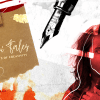Take note: How note-taking can come in handy when you’re short of inspiration

As an "elder millennial", I spent an analog childhood as a literature student where all the classroom notes, essay assignments, and diary entries had to be done by hand. While I've caught up with the times and learned to make my way around digital platforms and tools, I still derive pleasure from taking actual pen-to-paper notes when it comes to doing a brain dump, and have, over the years amassed a not inconsiderable number of notebooks that have been turned into sketchbooks and bullet journals, recording the mundane minutiae of my days, and from which I occasionally find inspiration when pressed for time and find myself in need of material or a reference for a feature or a creative piece.
My sister-from-another-mister Tarin, who is on the other end of the millennial spectrum, is an avid reader and a talented photographer. She records her life through beautifully composed shots, with poignant captions about the moment, her state of mind, and her literary/pop culture inspirations du jour for each image. While she insists she's not a writer, each post, each clip, and each reel is a thoughtful witness account of the world as she sees it.
And then there's my kid Usraat, a true-blue Gen-Z, who, like many of her generation, will "story" every waking moment on the fly, blurry images and keyboard smashing interspersed with memes and reels to create a chaotic, organic narrative, which, in calmer moments, she can reference for more thoughtful meditations on her journey and growth.
While our approaches have changed with technology, the basic idea remains the same: to record the world around us as we see it, to capture a moment for posterity.
More often than not, these little records become the springboard for longer pieces, raw material for other creative work.
Every so often, when I am trying to encourage someone to take up the Sehri Tales challenge, or helping a new feature writer learn how to pitch stories, or getting approached by beginner writers seeking tips on how to get going, or commiserating with professional writers about their latest bout of writer's block, the question that arises is: What do I write about? And for me, the answer goes back to that one very simple piece of advice I received very early on in my career: look around you, and take notes, and revert back to these when you're short of material. It is a practice that has paid back a thousandfold–providing me with inspiration, context, references and data. If that blank page and blinking cursor try to team up on you, there's no better ammo to have in your corner.
Sabrina Fatma Ahmad is an author and journalist. She is the founder of the annual Sehri Tales challenge.

 For all latest news, follow The Daily Star's Google News channel.
For all latest news, follow The Daily Star's Google News channel. 







Comments